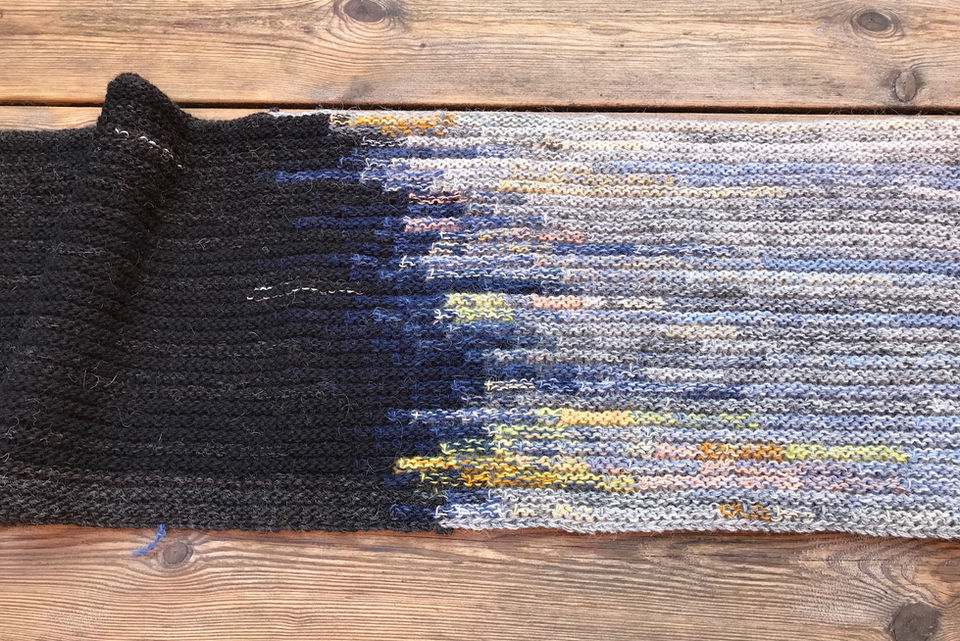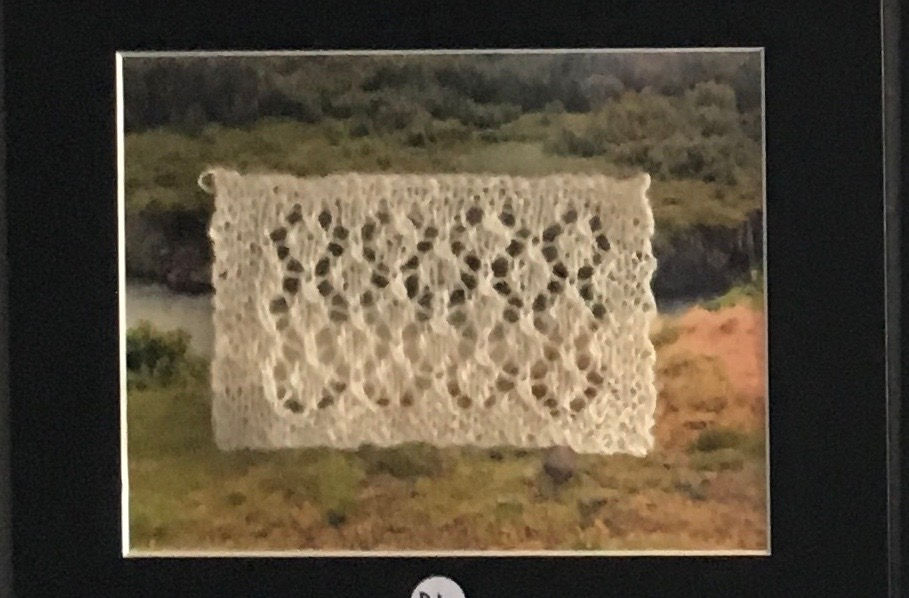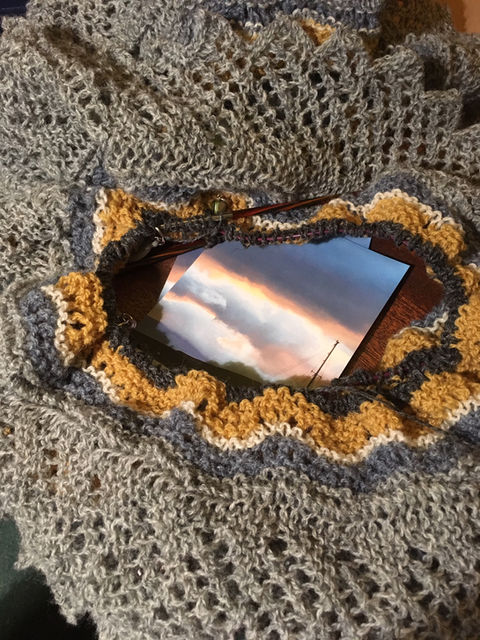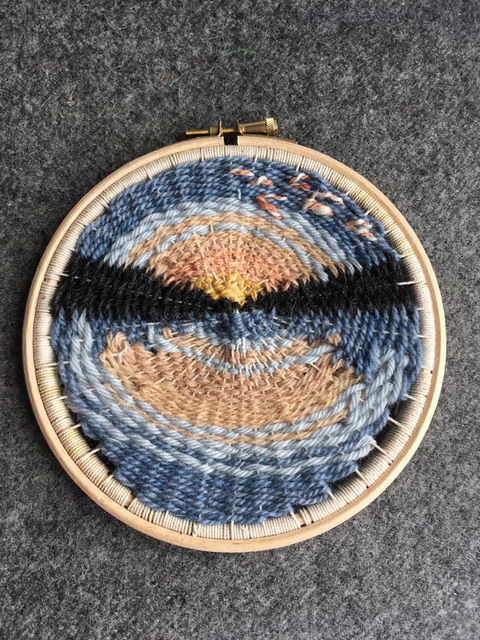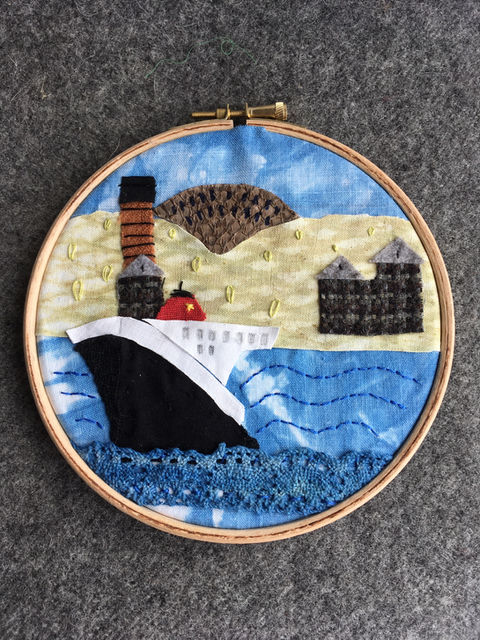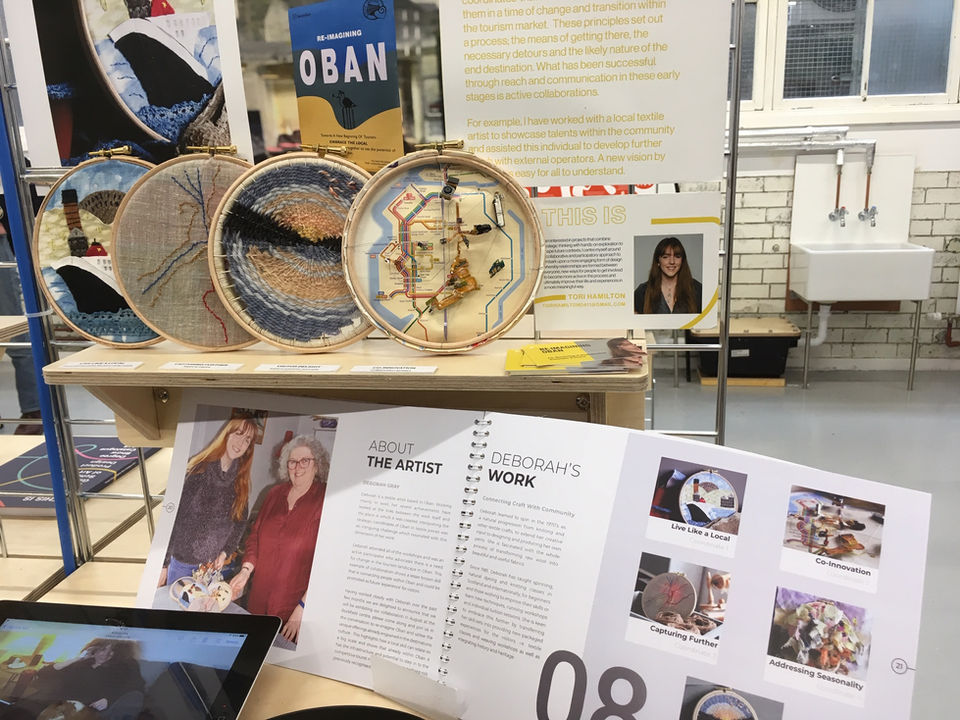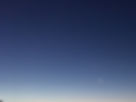
PROJECTS
Here are some of my recent projects. Each one has its own gallery - swipe along to see the project and its inspiration.
Temperature Blanket 2025
This year I am knitting a record of the temperature in my hometown, Oban, for the full year. I want it to show seasonal and daily variation so I am using stranded colourwork to record the minimum and maximum temperature every day. The background colour represents the day's minimum temperature, the colour of the simple diamond pattern represents the maximum.
I selected 16 shades of 100% Shetland wool yarn in a spectrum from dark blue (cold) to deep red (hot), with each shade representing a range of 2 degrees Celsius.
As much as possible I am knitting in real time - knitting the day's temperatures on that day.
I am knitting a separate rectangular block for each month, which when joined 4 across and 3 down will cover a double bed. Months with fewer than 31 days will have extra rows (without the diamond pattern) worked at the end to make up the length.
Temperature Blankets are not a new thing, lots of people crochet or knit stripes or squares in colours that represent the temperature each day, and there are many other ways.
This is my first full year Temperature Blanket despite teaching data visualisation in knitting workshops for a few years. I'm planning a year-long 2026 Temperature Blanket Knitalong which will kick off in November 2025 with in-person and on-line planning sessions. Contact me if you would like to join in.
I have made several other pieces which incorporate observations and data - scroll down through my Projects and you will find works about daylength, changing colours of the sky and even a kind of traffic survey.
DAY - TIME PROGRESSION
Exploring the progression of day time (sunrise to sunset) through a full year in Blonduos, Iceland and Oban, Scotland.
Inspired by my experience of changing daylength at home in Oban on the west coast of Scotland, and while on extended Residency periods in Blonduos, Northwest Iceland.
I recorded sunrise and sunset times in the two places every day for a year, starting at the winter solstice.
I set up a large natural indigo dyeing vat and dyed Shetland wool 2-ply jumperweight yarn and Istex Einband Icelandic wool yarn. Some of each type of yarn was natural white and some was natural light grey. I deliberately dyed a range of shades of blue to add some variety to the piece.
Taking 12 o'clock midday as a fixed point I calculated the number of minutes between sunrise and sunset in each place for every day.
The scale is two rows per day, and one stitch per four minutes.
As I knitted I used double Shetland wool when the sun was only up in Oban, double Icelandic wool when the sun was only up in Blonduos, and one strand of each when the sun was up in both places. I inserted a vertical marker line indicating 12 o'clock midday and contrasting marker lines at sunrise and sunset times. For the 40-day period around mid summer when the sun sets after midnight in Blonduos I inserted a black vertical marker line indicating midnight.
CELTIC ALPHABET TREES IN THEIR TRUE COLOURS
Linking indigenous languages and natural colours, this project depicts the Celtic alphabet and the trees associated with it. The association comes from the Ogham language, a precursor of Gaelic, where (we believe) each of the 18 letters was named for a tree as a teaching aid.
I dyed wool fabric and yarn with part of each of the 18 trees. Some were not easy to find, and there is debate about the translation of some of the tree names, but eventually we had collected all 18. With a group of volunteers helping to cut and stitch leaf shapes we made around 90 large leaves. One side of each leaf has the Ogham character or letter, the other side was the stitcher's choice of design. We hung the leaves on a beautiful piece of ivy driftwood contributed by Sheila Quillin, one of the volunteers.
This piece was one part of the EcoCreatives: Nurturing Creativity project supported by The Rockfield Centre, Oban and funded by Creative Scotland. In parallel, artist Thomas Keyes led two community workshops where the Celtic alphabet was illuminated in Insular style using deer parchment and natural pigments. Curator Naoko Mabon facilitated a series of Artist Conversations on line with global artists using natural pigments (recordings available on The Rockfield Centre website).
After a two-month exhibition with explanatory texts, materials displays etc., the Celtic Alphabet Trees piece now has a permanent home hanging in The Rockfield Centre, Oban.
TURF HOUSE
Inspired by Icelandic turf buildings. Constructed directly from the landscape since the time of the Settlement of Iceland, this was the main type of building until the mid 20th century. When they are abandoned, the buildings slowly return to the landscape leaving little or no trace.
I knitted individual blocks from unspun Icelandic wool, then lightly needlefelted them before joining them in patterns reminiscent of the ways the turf blocks are laid in traditional building styles. Intended as a wall piece, I wanted to see whether it could also be worn as a coat, complete with a hood echoing the grass roof.
The completed piece was photographed at Glaumbaer Turf Farm Museum in Skagafjordur, North West Iceland. Photos of the coat being modelled were taken beside The Icelandic Textile Centre in Blonduos.
Work compoleted during a Residency at Textilmidstod, (The Icelandic Textile Centre) in Blonduos, North West Iceland, November 2021.
NOVEMBER SKIES; BLONDUOS
Representing the changing colours of the sky over Blonduos throughout November. Every day I recorded the colours between 12 and 20 times, before translating them into this handknitted piece. One horizontal ridge represents each day.
HUNAFLOI
Hunafloi is the name of the large bay in Northwest Iceland between Vatsnes and Skagi peninsulas. The studio in the Icelandic Textile Centre looks northwards over Hunafloi. I used 12 colours and a repeating wave motif to capture the colours of the sea.
BASALT
Inspired by Icelandic columnar basalt rock formations as seen at Kalfshamarsvik, near the tip of the Skagi peninsula. Hand knitted in handspun undyed and naturally dyed Icelandic wool from a nearby farm.

STICTA CORONATA
Sticta coronata is a New Zealand lichen used for dyeing.
Using 100g of dry lichen sent to me by a New Zealand friend, I made a dyebath and used it to dye small batches of wool yarns, also some silk and linen fabrics. I kept re-using the dyebath, reheating the same lichen in it each time, and the colour gradually changed from deep purple through pinks to a pale pinky cream. Then I tore the lichen into small pieces, reheated it in the dyebath and it gave yellow shades. By dyeing some natural light grey yarns as well as white, I got an even greater variety of colours including greens (yellow dye on grey yarn).
ROADTRIPS
3 'scarves' documenting roadtrips in New Zealand, Iceland and Scotland.
On a roadtrip in New Zealand a conversation about random sequence generators ran in to a conversation about the lack of variety in car colours, which resulted in me recording the colour of every passing car for 2 hours. I knitted the first Roadtrip 'scarf' using New Zealand grown, spun and dyed wool, one row per car in the appropriate colour.
A long bus journey in Iceland, 7 hours from Akureyri to Reykjavik, saw me noting car colours again, and knitting the middle 'scarf'. Then I felt obliged to complete the series in Scotland by documenting a bus trip from Inverness to Oban.
POSTCARDS
Since March 2019 I have exchanged monthly knitted postcards with my friend and fellow textile artist Sue Elliott, from New Zealand. Each postcard reflects something significant in our lives that month. Although we don't co-ordinate theme or colours, I feel that as a whole, it is cohesive and a testament to creativity and friendship.
OF THE LAND: ICELANDIC WOOL PART 1: COLOUR
I spent the summer of 2018 as Artist in Residence at the Icelandic Textile Centre, exploring the characteristics and possibilities of Icelandic wool.
Icelandic sheep produce two distinct types of fibre in one fleece - long outer fibres called tog and shorter, softer inner fibres called thel. I separated the fibres by hand, spun them and experimented with dyeing them using locally available plants.
I was surprised to find that the tog fibres became more intensely coloured when both types were dyed in the same dyebath.
OF THE LAND: ICELANDIC WOOL PART 2: TEXTURE
By separating the tog and thel fibres and handspinning them before recombining, I created a number of yarns with different textures to exploit the differences in the fibres. In some yarn samples, I have used a natural black wool with the white, to highlight the structure. The photos on which the yarns are mounted were all taken around the Icelandic Textile Centre, where I carried out this work.
AFTER THE RAIN
Inspired by the view from my workroom.
After a day of heavy rain the sun tried to come through layers of cloud.
I constructed this large square shawl in the traditional Shetland way, starting with the grey lace edging, then picking up almost a thousand stitches for the coloured border, and finally filling in the centre with cosy garter stitch.
RE-IMAGINING OBAN
A collaborative project with Victoria Hamilton, a final year Product Design student at Glasgow School of Art. Tori asked me to produce five small pieces to illustrate the themes she had developed in her project. The pieces were shown as part of Tori's exhibit in the Glasgow School of Art Degree Show in 2019.





























